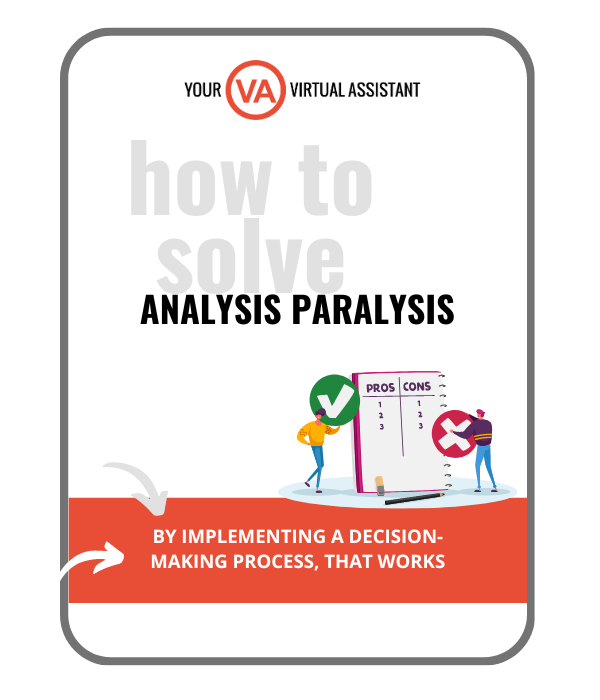Decision-making is an important part of being an entrepreneur. Every day, we’re called on to make decisions, both big and small.
From something as simple as deciding on a meeting time, right through to critical decisions like choosing the branding for a new product or deciding on the business’ core values.
Having to make so many decisions can often end up being a major source of stress and anxiety. And, sometimes, that stress leads to not making ANY decision at all.
There’s a fancy term for when this happens: Analysis Paralysis.
“The inability to make a decision due to over-thinking a problem, as a result of dealing with too many variables and continually researching solutions, instead of taking action and making a decision.”
The good news is, it is possible to manage Analysis Paralysis, and to break the habit of overthinking everything.
The Negative Effects of Analysis Paralysis
When we are in a state of analysis paralysis, the negative effects can affect all areas of our lives. Indecision can cause us to miss out on important opportunities, both personally and professionally, as we constantly worry about making the wrong choice. Additionally, analysis paralysis can be a drain on our mental and emotional energy, leaving us feeling exhausted and overwhelmed.
Common Reasons for Analysis Paralysis
There are several common reasons why people fall into the trap of analysis paralysis. One of the main culprits is fear of making a mistake. We are often afraid of making the wrong decision and facing the potential consequences. This fear can paralyse us and prevent us from taking any action at all.
Another common reason for analysis paralysis is the desire for perfection. We want to make the absolute best choice possible, so we obsessively analyse every detail and consider every possible outcome. This quest for perfection can be never-ending and can prevent us from ever making a decision.

The Importance of Confident Decision Making
Confident decision making is essential for personal and professional growth. When we make decisions with confidence, we are more likely to take action and move forward. Confident decision making allows us to trust our instincts and rely on our own judgment, rather than getting caught up in endless analysis.
Confident decision making also helps to build self-esteem and self-confidence. When we make decisions and see positive outcomes, it reinforces our belief in our own abilities and strengthens our confidence in future decision-making processes.
Overcoming Analysis Paralysis: Tips and Techniques
Now that we understand the effects of analysis paralysis, let’s explore some tips and techniques that will help your decision-making easier.

FREE DOWNLOAD
ANALYSIS PARALYSIS
Download this guide to discover the 3 strategies we use for our own decision-making processes.
Two Case Studies: Decision vs Indecision

Scenario 1: Meet Sarah
Consider Sarah, the founder of a local not-for-profit organisation dedicated to providing educational resources and mentorship to underprivileged youth in her community. Sarah’s organisation has been successful at a small scale, but she envisions creating a broader impact by establishing partnerships with local schools and community centres.
Sarah grapples with Analysis Paralysis, unsure of how to navigate the complexities of partnerships, funding requirements, and organisational expansion. However, with determination and the guidance of her mentors, Sarah decides to confront her fears and move forward with her vision.
Impact of Decision:
- Amplified Social Impact: By overcoming her Analysis Paralysis, Sarah’s not-for-profit organisation forms meaningful partnerships with local schools and community centres. This collaboration results in an expanded reach, allowing them to positively impact more underprivileged youth.
- Enhanced Donor Support: Sarah’s decisiveness and strategic approach to partnerships impress potential donors and funders. They see her organisation as a capable and visionary force for change, leading to increased financial support.
- Empowered Community: As Sarah’s organisation grows, the community gains access to a wider range of resources and opportunities. The positive ripple effect contributes to the overall development of the community.
- Personal Fulfilment: Overcoming Analysis Paralysis boosts Sarah’s confidence and sense of purpose. Witnessing the tangible impact of her decisions on the lives of the youth she serves fuels her passion and commitment to her organisation’s mission.

Scenario 2: Meet Jessica
Meet Jessica, the CEO of a fast-growing digital marketing agency. The industry is evolving rapidly, and Jessica’s team has identified a unique gap in the market for a cutting-edge data analytics service that could provide their clients with unparalleled insights into consumer behavior.
However, Jessica’s Analysis Paralysis prevents her from taking action. She is consumed by doubts about the feasibility of the service, concerns about the resources required for development, and worries about potential client reception. Months go by, and while Jessica is caught up in overthinking, a competitor swoops in, develops a similar service, and captures a significant portion of the market share.
Consequences:
- Missed Competitive Edge: By hesitating to seize the innovation opportunity, Jessica’s agency loses its competitive edge. The competitor’s service gains traction, and clients shift their business in favour of the more forward-thinking option.
- Stunted Growth: The agency’s growth trajectory slows down as it fails to diversify its service offerings to meet evolving client demands. This stagnation impacts both revenue and reputation.
- Employee Frustration: The agency’s talented employees become disheartened by the lack of progress and innovation. Morale drops, and key team members start seeking opportunities elsewhere, affecting overall productivity and quality of service.
These scenarios highlight the critical role that overcoming Analysis Paralysis plays in our organizations. Whether it’s seizing innovative opportunities or expanding social impact, decisiveness is the driving force that propels business toward growth, success, and positive change.

FREE DOWNLOAD
ANALYSIS PARALYSIS
Download this guide to discover the 3 strategies we use for our own decision-making processes.
This topic was first covered in our weekly newsletter, The Lever. Click here to open the issue which includes 1 fact, 1 tip, 1 tool and 1 question about overcoming Analysis Paralysis.
Resources
“A 4-Step Process for Making Better Decisions” by Full Focus (Michael Hyatt) reviews the book “Decisions” by Chip and Dan Heath where they share a 4-step process which can be applied to both your business, and your personal life.

